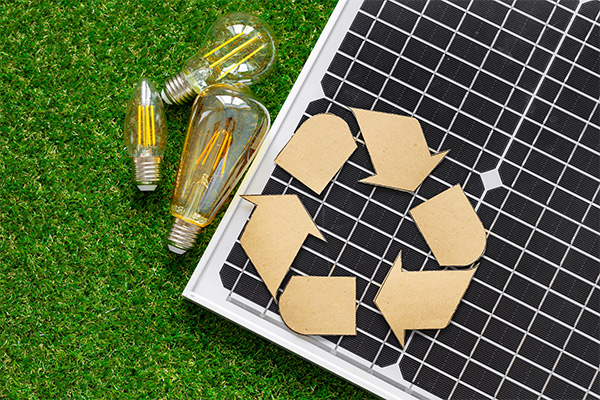
With solar panels installed, you can rest assured about your electricity bills, contributing to the green movement for about 25 to 30 years until they start breaking down slowly.
When your solar panels reach the end of their life, questions arise as to what’s next for these wonder devices. Let’s break down the afterlife of solar panels, and discuss the steps necessary for solar panel recycling.
If you’re still wondering if recycling solar panels is possible, then you may breathe a sigh of relief. Being composed of materials that can be recycled such as aluminum, copper, glass, and even semiconductors, recycling solar panels is a possibility in the long run.
According to research, with regulated processes, you can recycle 96% of all solar panel materials.

Recycling is a possibility, but it isn’t exactly the easiest of tasks, and there are hurdles along the way that make this venture questionable.
To begin with, disassembling these panels to recover the valuable materials isn’t easy at all. Since these devices were made to withstand impossibly tough conditions, breaking them down requires even more effort.
Moreover, they contain harmful materials like lead or cadmium, which necessitate caution when handling.
The second hurdle concerns value. Most times, the recycling process costs much more than the value of the materials extracted.
Unless regulatory bodies rigorously enforce solar panel recycling and the market shifts to enable cost-effective recycling, these panels will typically end up being dumped in landfills.
Despite the hurdles, there’s a ray of hope for solar panel recycling. Though largely unexplored, numerous opportunities exist for advancing solar panel recycling.
Emerging techniques, such as those utilizing acid solutions to extract pure silicon or employing thermal processes for metal reclamation, illuminate the path forward for solar panel recycling.

With the recognized opportunities and roadblocks in the way, how can we actively promote the conditions required for consistent and efficient recycling of solar panels?
Solar panels are manufactured with the sole purpose of providing energy throughout their lifetime, often without a clear vision for their eventual recycling.
If solar panel manufacturers prioritize the design of modules that are readily recyclable and incorporate fewer hazardous materials, the future of solar energy could be perceived in a more positive light.
Allocating resources for research and development aimed at creating viable and practical solar panel recycling methods is crucial for instigating the change necessary to establish a more efficient and continuous panel recycling system.
Through closely supervised research efforts, it is also possible to generate designs that are environmentally sustainable for the future.
If a significant entity like the government takes the initiative by implementing regulations for solar panel recycling, manufacturers would inevitably develop solutions that contribute to the overarching goal of sustainability, which solar panels were originally intended to support.
However, currently, no laws, policies, or regulations are in place to mandate such actions.
The solar industry, if it takes the lead, holds the potential to drive the transformation toward solar panel recycling.
By fostering collaborations that culminate in the establishment of recycling practices for solar panels, the industry can play a pivotal role.
Through a unified endeavor involving manufacturers, recyclers, and researchers, the catalyst for innovation might be just on the horizon.

Materials that make up solar panels, such as glass, aluminum, and semiconductors, solar panels are indeed recyclable, allowing for the reuse of their components. Nevertheless, the recycling process is not as straightforward as it might appear.
Delamination:
The first step involves overall disassembly. It involves the removal of the frame, wires and junction box, breaking the panel down into simple components that will then be moved to the next crucial step
Material Separation:
Once the core components are separated, and the solar panel disassembled entirely, the components all go through a shredder that breaks them down into manageable pieces which are then sorted and sent for separate recycling processes.
Material Extraction and Purification:
At the end stage of the intricate recycling process that involves separate methods for recycling each type of component, essential materials are purified and extracted for reuse.

It should come as no surprise that recycling has an impact on the environment.
According to a recent study, the recycling phase increases the environmental impacts of c-Si panels from cradle to gate by an additional 15 to 35%. The kind of recycling method used can significantly change these numbers.
The lifecycle impact of CdTe panels is only increased by about 3-4% during the recycling phase. This is primarily due to the fact that more chemicals are needed to separate c-Si materials than CdTe.
According to the study, silver recovery should be the main focus of c-Si panel recycling in order to minimize negative environmental effects and cut costs.
Since glass makes up roughly 94% of CdTe panels, glass recovery and the rare earth metals cadmium and tellurium should be the main areas of attention.
Although there are difficulties in recycling solar panels, there are also exciting opportunities. We can further increase the sustainability of renewable energy by taking into account every stage of the solar panel life cycle, from manufacturing to disposal.
Recycling can also play a significant role in the development of clean energy in the future with more research, supportive laws, and cooperation.
